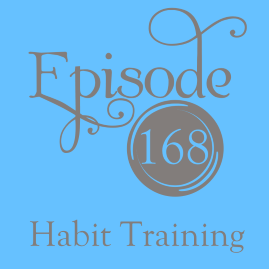
“Education, said Charlotte Mason, is an “atmosphere, a discipline, and a life.” Habit formation, the discipline, is fundamental to our function as persons. Miss Mason offers descriptions of habit formation as well as counsel on habit training. Emily, Liz, and Nicole discuss the essentials for building those habits that make for “the good life.”
Listen Now:

Home Education (Volume 1): Part III, Habit is Ten Natures and Part IV, Some Mental and Moral Habits
Parents and Children (Volume 2): Chapter XVI: Discipline

“Consideration made the reason of the failure plain: there was a warm glow of goodness at the heart of every one of the children, but they were all incapable of steady effort, because they had no strength of will, no power to make themselves do that which they knew they ought to do. Here, no doubt, come in the functions of parents and teachers; they should be able to make the child do that which he lacks the power to compel himself to.” (1/99-100)
“The problem before the educator is to give the child control over his own nature, to enable him to hold himself in hand as much in regard to the traits we call good, as to those we call evil:––many a man makes shipwreck on the rock of what he grew up to think his characteristic virtue––his open-handedness, for instance.” (1/103-104)
“We are all mere creatures of habit. We think our accustomed thoughts, make our usual small talk, go through the trivial round, the common task, without any self-determining effort of will at all. If it were not so––if we had to think, to deliberate, about each operation of the bath or the table––life would not be worth having; the perpetually repeated effort of decision would wear us out. But, let us be thankful, life is not thus laborious. For a hundred times we act or think, it is not necessary to choose, to will, say, more than once. And the little emergencies, which compel an act of will, will fall in the children’s lives just about as frequently as in our own. These we cannot save them from, nor is it desirable that we should. What we can do for them is to secure that they have habits which shall lead them in ways of order, propriety, and virtue, instead of leaving their wheel of life to make ugly ruts in miry places.” (1/110-111)
“Every day, every hour, the parents are either passively or actively forming those habits in their children upon which, more than upon anything else, future character and conduct depend. ” (1/118)
“[L]et me say that the education of habit is successful in so far as it enables the mother to let her children alone, not teasing them with perpetual commands and directions–a running fire of Do and Don’t; but letting them go their own way and grow, having first secured that they will go the right way, and grow to fruitful purpose.” (1/134)
“…to point out the miseries that must arise from this fault, and the duty of over-coming it…” (1/120)
“The mother devotes herself to the formation of one habit at a time, doing no more than keep watch over those already formed.” (1/136)
“It is evident that to administer rewards and punishments on this principle requires patient consideration and steady determination on the mother’s part. She must consider…what fault of disposition the child’s misbehaviour springs from; she must aim her punishment at that fault, and must brace herself to see her child suffer present loss for his lasting gain.” (1/148)
“Boys and Girls are generally Dutiful-It would be better for boys and girls to suffer the consequences of not doing their work, now and then, than to do it because they are so urged and prodded on all hands that they have no volition in the matter. The more we are prodded the lazier we get, and the less capable of the effort of will which should carry us to, and nearly
carry us through, our tasks. Boys and girls are, on the whole, good, and desirous to do their duty. If we expect the tale of bricks to be delivered at the due moment without urging or entreating, rewarding or punishing, in nine cases out of ten we shall get what we look for. Where many of us err is in leaning too much to our own understanding and our own efforts, and not trusting sufficiently to the dutiful impulse which will carry children through the work they are expected to do.” (3/39-40)
“…the incessant watchfulness and endeavour which go to the forming and preserving of the habits of the good life…” (2/173)
“Knowing that the brain is the physical seat of habit and that conduct and character alike, are the outcome of the habits we allow; knowing, too, that an inspiring idea initiates a new habit of thought, and hence, a new habit of life; we perceive that the great work of education is to inspire children with vitalising ideas as to every relation of life, every department of knowledge, every subject of thought, and to give deliberate care to the formation of those habits of the good life which are the outcome of vitalising ideas. In this great work we seek and assuredly find the co-operation of the Divine Spirit, whom we recognise, in a sense rather new to modern thought, as the supreme Educator of mankind in things that have been called secular, fully as much as in those that have been called sacred.” (3/172-173)



This reminds me so of Benjamin Franklin’s Book of Virtues.
What do you do when they don’t do what’s expected? How do you discipline?
Amy, you must draw some natural consequences that are related to the behavior. Sew seeds of good ideas. Enforce what is expected so they understand that you mean what you say. May we suggest you give it a listen again watching for those points?